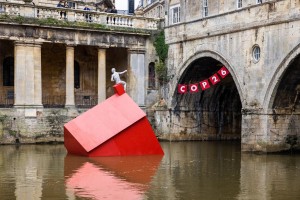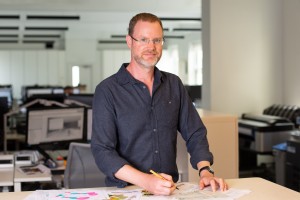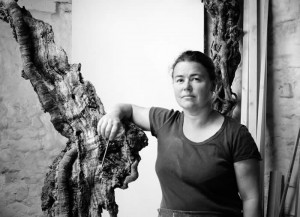A powerful symbol of the need for urgent action on the climate emergency has appeared alongside one of the West of England’s most iconic tourist attractions – the result of collaboration between a Bristol architect, businesses, an artist and a council.
The 5.5m by 3.5m wooden house appears to be sinking in the River Avon in front of Bath’s iconic Pulteney Bridge with a sculpture of a person on its roof clinging on to a cord. The cord reads ‘COP26’ and is attached to the bridge, stopping the house from sinking.

Inspired by teenage climate campaigner Greta Thunberg’s ‘Our house is on fire’ speech at the 2019 World Economic Forum and influenced by the devastating floods in Europe this year, the art installation represents how COP26 offers the world a lifeline to avert disaster.
Behind the installation is Bristol-headquartered national architectural practice Stride Treglown, which worked on the concept with Bath-based engineering design consultancy Format Engineers.
They teamed up with Bath artist and sculptor Anna Gillespie, Greenman Environmental Management and Fifield Moss Carpentry, both also based in Bath, to produce the sinking house ahead of landmark COP26 conference, which starts in Glasgow on Sunday.
Bath Sea Cadets have been engaged from the beginning of the project, donating their pontoon to help float the structure and create the submerged effect.
Stride Treglown head of sustainability Rob Delius, pictured, said the firm, which is employee-owned and has 300 staff across its eight offices, including one in Bath, was conscious of its responsibility to reduce its impact on the environment but also be a catalyst for positive change.
“As a B Corp and a carbon neutral business, we wanted to use the piece to highlight the severity of the climate emergency,” he said.
 “Ahead of COP26, we encourage world leaders to recognise the importance of this opportunity to take meaningful action. We hope that this installation, which has been a collective community effort, helps that message to sink in.”
“Ahead of COP26, we encourage world leaders to recognise the importance of this opportunity to take meaningful action. We hope that this installation, which has been a collective community effort, helps that message to sink in.”
Format Engineers has worked on projects as diverse as art installations in New York to a museum in Spain via temporary pavilions in London and Milan.
Director Stephen Melville added: “As a Bath-based business we wanted to contribute to our local community, who have all been extremely supportive in helping us create this.
“We recognise that there is still a huge amount to do as an industry to bring us in-line with climate change targets, and fully endorse the message the installation sends on a sector, local and global level.
“This dramatic and important symbol of climate change against such a historic backdrop will hopefully encourage those in positions of power to do more.”
Bath & North East Somerset Council deputy leader and cabinet lead for climate and sustainable travel, Sarah Warren, said the council was “proud and excited” that Stride Treglown and Format Engineers had worked with the community, businesses and a local artist to bring the concept to life in the centre of the city.
 “Positioning this art installation in the water in front of the iconic Pulteney Bridge means it will be seen by thousands of residents and visitors and will hopefully inspire conversations about the long-term impacts of climate change and the importance of working collaboratively to protect the environment,” she said.
“Positioning this art installation in the water in front of the iconic Pulteney Bridge means it will be seen by thousands of residents and visitors and will hopefully inspire conversations about the long-term impacts of climate change and the importance of working collaboratively to protect the environment,” she said.
“The recent floods signify just a small part of the effects of climate change. We must all act now to save the planet,” she said.
“Contributing to this message through the arts is just a small part of what I can do to ensure protecting our environment is the top priority.”
The sinking house was built with timber to ensure it is low carbon. Format Engineers and Stride Treglown also worked with local tradespeople to help build the sculpture to minimise transport emissions and keep the installation as sustainable as possible.
The installation will be in position until November 7. Once dismantled, its timber will be donated to the Bristol Wood Recycling Project.





























